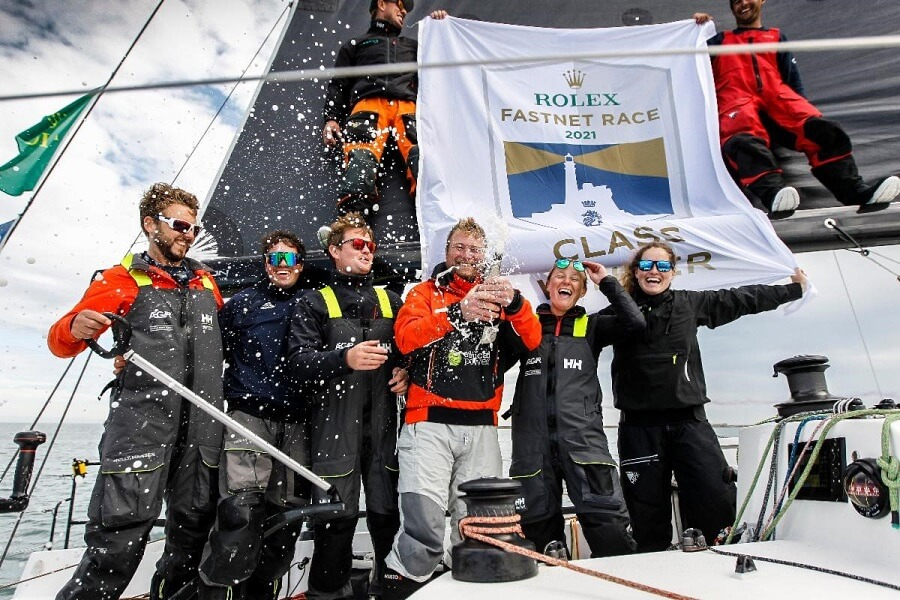 alt="Sunrise wins 49th Rolex Fastnet Race"/>
alt="Sunrise wins 49th Rolex Fastnet Race"/>
Tom Kneen’s JPK 11.80 Sunrise has been crowned overall winner of the 49th Rolex Fastnet Race from Cowes to Cherbourg. Kneen is the first British winner of the race since Charles Dunstone and his maxi Nokia Enigma in 2003.
Sunrise had already been confirmed as runaway winner of the IRC Two division before organiser Royal Ocean Racing Club announced that no other boat still racing on the 695nm course could catch the British boat for overall honours.
“I’ve had 24 hours to reflect on the race after we finished yesterday and it really is all about the people, the amazing team that sailed with me, and my incredible partner Francesca who has done so much to make this happen,” said Kneen.
“If I have one regret, it’s that in this special moment, Francesca wasn’t able to be with me on this race because she was back at home looking after our two-year-old. She is the one who has made it possible for me to do this race.”

Sunrise sets sail on the 49th Rolex Fastnet Race; Photo: Kurt Arrigo/RORC
Volvo Ocean Race veteran Dave Swete was the only pro sailor on the Sunrise crew. Apart from Swete and Kneen in their late 30s, the rest of the crew are in their 20s, some of whom have come up through the RORC’s Griffin youth racing programme aimed at fostering young offshore talent. Suzy Peters and Tom Cheney were co-navigators on the race and were joined by Quentin Bes-Green, Angus Gray-Stephens, George Kennedy and Victoria Tomlinson.
As a boy, Kneen used to sail dinghies at the Royal Western Yacht Club in Plymouth, but only took up offshore racing seven years ago. When he started, he admits, “I didn’t know what IRC was, I’d never really heard of the RORC, but I had heard of the Rolex Fastnet Race.”
By his own admission, Kneen’s first Rolex Fastnet Race in 2015 was a comedy of errors aboard his second-hand Elan 350 cruiser/racer called Sunrise, but he has quickly worked out what it takes to put together a race-winning campaign.
“It doesn’t really matter what level in the fleet you’re at. If you have a good crew and the right support, then you can win your class. And if you can win the class, you can win overall, although that depends on things like tidal gates, wind conditions, things that are much more in the hands of the gods, I think.”
Sunrise struggled in the early stages of the race, always out of phase with the tide as they beat towards Land’s End. But a counterintuitive and brave decision to sail around the eastern side of the traffic separation scheme at Land’s End was the team’s first big break. This put them in a unique position to stay just in front of an area of high pressure that swallowed up the chasing pack just a few miles behind.

Sunrise received a hero’s welcome in Cherbourg; Photo: Paul Wyeth/pwpictures.com
“It’s quite amazing to look back at that stage of the race. It was a critical moment where we really pushed hard. It was probably the difference between finishing at 10 o’clock in the morning on Thursday or finishing the same time the following day.”
By staying ahead of the high-pressure system, Sunrise had done a horizon job on the rest of IRC Two. It was a breakaway move that ultimately proved sufficient to overhaul RORC Commodore James Neville’s HH42 Ino XXX and claim the Fastnet Challenge Cup for the overall winner under IRC corrected time.
Loyal Plymothian that he is, Kneen admits to being pleasantly surprised by the warm welcome he received coming into Cherbourg.
“It’s not lost on me the irony that the first year the race finish moves to a French town it’s won by a Plymouth boat, by someone who voted against moving the finish to Cherbourg,” he said.
“I wasn’t particularly positive about the change of finish because I’m loyal to Plymouth and we really didn’t know what to expect when we arrived in Cherbourg. But the welcome at the finish was amazing. The village is something else, the whole experience was incredible.”